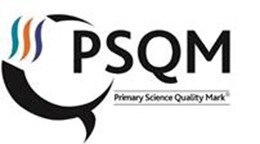"Remember to look up at the stars and not down at your feet." Steven Hawking
We are delighted to announce that we have been awarded the Primary Science Quality Mark in Autumn 2023!

How Science supports our school's vision:
Learning both Knowledge and Skills:
Our science curriculum has been carefully developed to provide all children with the foundations necessary for deepening their understanding of the world around them. In a fast-changing society in which science plays an ever expanding role, all pupils are equipped with the skills and knowledge needed to help them think scientifically and recognise how science may impact on their lives - now and in the future.
Our units have been carefully mapped over a two-year rolling programme to ensure children meet the right knowledge, vocabulary and skills at the right time and that all learning, both substantive and disciplinary, is progressive.
Principles of Science teaching at Aberford:
OutsideOur outdoor spaces and local area are utilised to provide regular outdoor learning experiences.
|
InspiredWe are excited by our learning and are motivated to continue at home and in our community.
|
PracticalWe have hands-on, practical experiences using real life contexts where possible.
|
ScientificWe are scientific in our approach, using scientific vocabularyand enquiry led learning.
|
Well ResourcedWe have quality books and resources to support our learning.
|
QuestioningWe are curious, enthusiastic and inquisitive about the world and ask big questions.
|
Enquiry Types:
These are mapped across all the 12 units of work that the children will cover in each two year cycle. They are referred to explicitly in science lessons and children build on the expected disciplinary skills and vocabulary as they move through school.

Observing Over Time:
Pupils identify and measure events and changes in living things, materials and physical processes or events. These observations may take place over time spans of minutes or hours up to several weeks or months.
Pattern Seeking:
Pupils make observations and measure to explore natural events where there are variables that they can't easily control. They seek to identify patterns in the measurements, which may lead to other investigations in an effort to try to explain why a particular pattern occurred.
Identifying, Classifying and Grouping:
Pupils identify and measure events and changes in living things, materials and physical processes or events. These observations may take place over time spans of minutes or hours up to several weeks or months.
Research using Secondary Sources:
Pupils use a range of secondary sources (books, websites, articles people, videos, etc) to gather evidence to answer questions. They look for patterns in the information they collect, evaluating the reliability and trustworthiness of the evidence they collect when drawing conclusions.
Comparative and Fair Testing:
Pupils identify the effect of changing one variable on another whilst attempting to keep other variables constant. They are useful for gathering data that might inform predictions and further tests. In comparative tests pupils compare one event with another and identify different outcomes. With fair tests, pupils look to identify a causal relationship between two variables.
Science - Long Term Plans and Progression
.jpg)